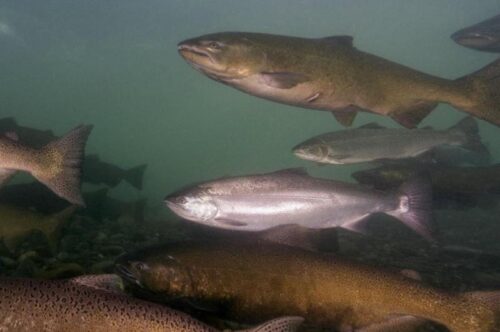
Sportsmen’s Alliance On Gulf Of Alaska Chinook: ‘Unconscionable’ To Consider Listing Them

There is more pushback over whether or not to list Gulf of Alaska Chinook as threatened. Earlier this week Alaska Department of Fish and Game sent a letter to the National Fisheries Marine Service questioning why the fish are under a 90-day review to hit threatened status. And today, the Sportsmen’s Alliance released the following statement in opposition to the potential ESA listing for the salmon:
ESA Listing for Gulf of Alaska Salmon Opposed by Sportsmen’s Alliance
September 12, 2024
The Sportsmen’s Alliance Foundation has submitted comments to the National Oceanic and Atmospheric Administration’s (NOAA) National Marine Fisheries Service (NMFS) encouraging NMFS to issue a not-warranted finding on a petition from animal extremists asking NMFS to list Chinook salmon in the Gulf of Alaska as threatened or endangered under the Endangered Species Act (ESA).
On May 24, 2024, NMFS issued a positive 90-day finding on a petition submitted by the Wild Fish Conservancyasking NMFS to list Chinook salmon, or any evolutionarily significant unit that may exist in the petitioned area, as a threatened or endangered species under the ESA and to designate critical habitat concurrent with the listing. NMFS’s positive 90-finding means the agency found “the petition . . . presents substantial scientific or commercial information indicating that the petitioned action may be warranted.” A positive 90-day finding means that the first hurdle for placing Chinook salmon on an ESA list was cleared. NMFS is now working on a 12-month finding to determine its final recommendations for southeast Alaska Chinook salmon.
The Sportsmen’s Alliance has significant concerns about the wide-sweeping impacts of the potential listing of Gulf of Alaska Chinook salmon as a threatened or endangered species under the ESA and strongly disagree that listing is warranted. Similarly, we remain opposed to the designation of critical habitat for Gulf of Alaska Chinook salmon under the ESA and the undertaking of the incredibly broad status review requested by the petitioners.
It would be unconscionable for NMFS to conclude in its 12-month finding that listing a southeast Alaska Chinook salmon under the ESA is warranted. Specifically, among other flaws, the petition misrepresents or omits information on aggressive and successful regulatory protections and conservation activities historically and currently being implemented by the state of Alaska. Additionally, per the NMFS own determinations, the petitioners have failed to provide a complete and balanced representation of relevant facts, and “the petition contained numerous factual errors, omissions, incomplete references, and unsupported assertions and conclusions.”
We also have major concerns that the ESA’s petition process is being, and will continue to be, leveraged to strong-arm state and federal agencies into Chinook salmon management strategies that are based on emotion and ideologies instead of sound science. The Alaska Department of Fish and Game (ADF&G) has successfully managed salmon stocks – Chinook and other species – in the Gulf of Alaska and elsewhere for decades, and it continues to invest in marine salmon research to understand any stock declines and identify potential solutions. There is no evidence, despite the best efforts of the petition, to indicate that (1) ESA listing is warranted for Gulf of Alaska Chinook salmon or (2) that ADF&G’s current management strategies are inadequate.
We’ve urged NMFS to fully consider all information received during its public comment period, including information provided that has been omitted, ignored, or is contrary to the data provided in the petition. Undoubtedly, many stakeholders – public, private, and commercial – hold significant vested interests in sustainably managed Chinook salmon in the Gulf of Alaska. These stakeholders – especially those in Alaska – have continuously worked in collaboration to ensure healthy stocks and sustainable yields. We also urge NMFS to let science and statute guide the listing process – not emotion or ideology. We’re confident that information and data provided by varied stakeholders will show that a not-warranted finding is appropriate.
About the Sportsmen’s Alliance: The Sportsmen’s Alliance protects and defends America’s wildlife conservation programs and the pursuits – hunting, fishing and trapping – that generate the money to pay for them. Sportsmen’s Alliance Foundation is responsible for public education, legal defense and research. Its mission is accomplished through several distinct programs coordinated to provide the most complete defense capability possible. Stay connected to Sportsmen’s Alliance: Online, Facebook, Twitter and Instagram.



